Drowned in Sound
Hosted by Sean Adams, founder of Drowned in Sound, this weekly podcast explores how culture, politics, and the climate crisis are reshaping music. From AI and activism to festival futures and the collapse of local scenes, we treat music as an ecosystem, not just entertainment. Guests include artists, changemakers, and organisers reimagining what music can be. Subscribe and join the conversation.
Episodes
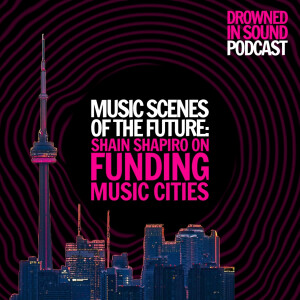
Sunday Mar 02, 2025
Sunday Mar 02, 2025
What makes a great music city? How do governments, venues, and fans keep local music scenes alive? And why is music still not treated as an essential part of a city’s economy?In this episode of the Drowned in Sound Podcast, Sean Adams speaks with Shain Shapiro, founder of Sound Diplomacy and a leading advocate for integrating music into urban policy. Shain has advised cities and governments worldwide on how to invest in music, build better infrastructure, and ensure that artists and venues don’t just survive but thrive.The future of music scenes isn’t just about artists - it’s about infrastructure, investment, and policy. Without real change, we risk losing the cultural spaces that make music thrive.Topics Covered:The future of music cities: Why local scenes are vital and how they can be protectedMusic as an economic and public good: Why governments should treat music like any other essential sectorEmerging music markets: Where the global music hotspots of the future might beLive Nation: How monopolies shape local music ecosystemsThe importance of local media and community spaces in sustaining music scenesHow cities can future-proof music amid climate, economic, and technological shiftsShain Shapiro explains: “We don’t make data-driven decisions about music the way we do about transit, healthcare, or housing, yet music is an essential part of a city’s fabric.”Episode Highlights & Timestamps:00:00 – Introduction: Can We Save Our Music Scenes?01:04 – The Future of Music: What Will 2050 Sound Like?02:33 – The Big Challenges Facing the Music Industry04:44 – Music as an Economic & Public Good: Why Governments Should Care09:11 – Shain’s Journey: From Record Shops to Global Music Policy14:08 – Music Cities: How Governments Can Invest in Local Scenes19:51 – Global Music Growth: Why Africa & Southeast Asia Are the Future28:25 – Community & Local Government’s Role in Music Sustainability35:50 – The Live Nation Monopoly, Local Media, & How Cities Can Push Back40:00 – Final Thoughts: What Needs to Change & What Fans Can DoFurther Reading & Resources:Sound Diplomacy – Leading global consultancy on music and city planningMaking Places Better Newsletter – Shain Shapiro’s insights on improving urban spaces through music and cultureMusic Venue Trust – Protecting grassroots venuesCardiff Music Strategy – A model for city-led music investmentFonds de la Musique Canada – Canada’s funding model for music exportsLive DMA – European network for live music venuesJoin the discussion on the Drowned in Sound Community, message me on Bluesky, or email me at sean@drownedinsound.org.Get More Music Insights – Subscribe to the Drowned in Sound Newsletter for deep dives into the future of music.About the Host:Sean Adams is the founder of Drowned in Sound, established in 2000 as a pioneering music webzine. Beyond his editorial work, Sean manages artists such as Charlotte Church and The Anchoress, operates the DiS independent record label, and contributes to strategic communications for music initiatives like Music Venue Trust. His passion lies in championing diverse music scenes and supporting artists across genres.About the Guest:Shain Shapiro, PhD is the founder and executive chairman of Sound Diplomacy, the leading global consultancy on music and city planning. He also serves as the executive director of the not-for-profit Center for Music Ecosystems. Shain has authored This Must Be The Place: How Music Can Make Your City Better, exploring the intersection of music and urban development. His work has influenced over 130 cities worldwide to invest in music and culture, redefining the value of music in urban settings.
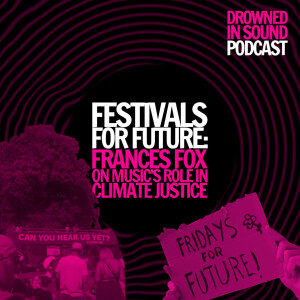
Sunday Feb 23, 2025
Sunday Feb 23, 2025
Music has long been a force for change but as extreme weather disrupts events and the industry grapples with its own environmental footprint, can music be a meaningful part of the climate justice movement?In episode 2 of season 3 of the Drowned in Sound Podcast, Sean Adams speaks with Frances Fox, founder of Climate Live and a leader in the UK’s youth climate strikes. Frances shares her journey from music fan to activist, why festivals are powerful spaces for engagement, and how the music industry can move beyond greenwashing to drive real action.This episode explores:Why festivals are at risk from the climate crisisHow music fans can help shape the climate conversationThe role of artists, venues & labels in pushing for a sustainable futureThe reality of music’s carbon footprint and what needs to changeThe Solar-Powered Pink Bus—and why Climate Live is taking a message of climate justice straight to festival crowds whilst applying glitter and temporary tattoosFrom touring impacts to activism strategies, this episode breaks down the intersection of music and climate justice, offering real insights into what fans, artists, and the industry can do next.“Engaging the unengaged is my jam—when you meet people where they're at, like at a festival, it's very chill.” – Frances FoxEpisode Highlights:00:00 – Introduction: Can Music Be a Force for Climate Justice?05:00 – Frances Fox’s Journey: From Festival-Goer to Climate Activist09:20 – Festivals & Climate Change: How Extreme Weather Is Reshaping Live Music15:40 – Touring, Vinyl & Streaming: The Hidden Environmental Cost of Music22:00 – The Solar-Powered Pink Bus: Taking Climate Conversations to Festivals30:00 – Roles in the Resistance: How Fans & Artists Can Push for Industry Change40:00 – Call to Action: What’s Next & How Listeners Can Get InvolvedFurther Reading & Resources:Climate Live – Join the movement and apply to performFridays for Future – Global climate strike movementChoked Up – Campaigning for air quality in marginalized communitiesDisha Ravi – Indian climate activist's WikiRoles in the Resistance Poster – Find your place in climate activismJulie's Bicycle – Sustainability in the creative artsTori Tsui – Climate activist and author of It's Not Just YouDominique Palmer – Climate activist and speakerMusic Declares Emergency – Musicians demanding climate actionMusic Venue Trust – Protecting grassroots music venuesSafe Gigs for Women – Creating safer environments for women at gigsTeach The Future - teachthefuture.ukRozzi - Artist who wrote a song about LA firesStop Rosebank – Campaign against new oil fieldsFossil Fuel Non-Proliferation Treaty – Ending fossil fuel expansionEarthPercent – Brian Eno’s initiative for climate fundingMake My Money Matter – How your bank funds fossil fuelsRainforest Foundation UK – Protecting the Congo BasinReverb – Eco-friendly music toursMassive Attack's Climate Initiatives – Band's efforts for sustainable festivals📩 Get More Music Insights – Subscribe to the Drowned in Sound Newsletter for deep dives into the future of music: http://drownedinsound.org🎵 Music by SoundMirrorWhy This Matters:Festivals are already being disrupted—Boardmasters, Standon Calling, and others have faced cancellations due to extreme weather, and independent festivals may not survive rising insurance costs.The music industry still relies on fossil fuels—From plastic-heavy vinyl production to major labels backed by oil & gas investments, there’s a deeper connection than many realise.Musicians & fans have power—From sustainable touring to rethinking sponsorships, music can lead the way—but only if more people demand change.
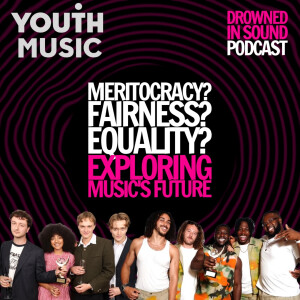
Sunday Feb 16, 2025
Sunday Feb 16, 2025
From grassroots venues and youth music programs to Mercury Prize winners, early support shapes who gets to make music—and who doesn’t. But is access to music a right or a privilege?Music should be for everyone - but is it becoming a luxury only the privileged can afford?Episode one of season 3 of the DiS podcast, explores how Youth Music -a UK charity funding grassroots projects - is fighting to create fairer opportunities for young musicians facing financial, social, and industry barriers.In this episode of the Drowned in Sound Podcast, Sean Adams speaks with Matt Griffiths, CEO of Youth Music, about hidden inequalities in the music industry and the work being done to create opportunities for the next generation of musicians.From youth-led projects and grassroots funding to the systemic barriers keeping working-class musicians out, this episode explores how music’s future can be more inclusive, diverse, and fair.This episode also features Ezra Collective’s Mercury Prize-winning speech, where they credit their success to the support they received early on:“This is not just Ezra Collective’s moment, this is a moment for every single organisation that’s championing young people making music.”Read the full speech here:The Line of Best FitThe Drowned in Sound Podcast maps the future of music and explores what's happening in the industry right now, with a strong moral compass. It connects music, culture, and ethics, offering deep dives into the issues shaping the way we create, consume, and sustain music.Why This Matters:Music has the power to change lives - but only if everyone has the chance to participate. Rising costs, funding cuts, and industry gatekeeping are making it harder than ever for working-class musicians to break through. In this episode, we explore what’s at stake, what’s changing, and how we can fight for a better future in music.Topics Covered: Why music is increasingly a career for the privileged From youth projects to Mercury Prizes: why access matters How the industry is shutting out working-class talent The critical role of Youth Music in opening doors The funding crisis: why 25% of grassroots projects are at risk “It’s not a pipeline, it’s flight pathways” – how opportunity shapes careers What real change looks like - and how to make it happenFurther Reading: Youth Music – Find out more and get involved: https://youthmusic.org.uk/ "I Will Forever Remain Faithful" Essay – Read more: Oxford American Drowned in Sound Newsletter – Subscribe for music insights: http://drownedinsound.orgEpisode Timestamps: 00:00 Introduction: Is Music Becoming a Privilege? 01:15 Why Youth Music Exists & What It Does 04:30 How the Industry Is Failing Young Artists 07:50 What Happens When You Can’t Afford to Make Music? 11:10 From Youth Projects to the Mercury Prize – Success Stories 14:40 The Funding Crisis: What’s At Risk? 18:20 How We Ensure Music’s Future Is For Everyone 21:30 Ezra Collective’s Speech & the Power of Community 40:00 Final Thoughts & Call to ActionJoin the Conversation: Who really gets a chance to make music today? Join the discussion on the Drowned in Sound forum or leave a review with your thoughts. Support Youth Music – Help fund grassroots music projects: https://youthmusic.org.uk/ Get More Music Insights – Subscribe to the Drowned in Sound Newsletter for in-depth analysis on the future of music: http://drownedinsound.org
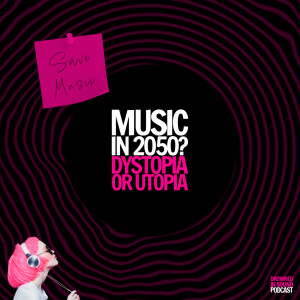
Sunday Feb 16, 2025
Sunday Feb 16, 2025
How will music survive until 2050? Will streaming monopolies and economic pressures lead to music’s decline, or can we build a fairer, more sustainable future?In this season three prologue of the Drowned in Sound Podcast, host Sean Adams (founder of Drowned in Sound) reflects on his lifelong love of music, the systemic challenges facing artists, and what the next 25 years could mean for independent musicians, grassroots venues, and the future of the industry.In this series, expect big questions, deep dives, and conversations with artists, industry leaders, and changemakers who are shaping what comes next.Drowned in Sound’s podcast is about a life built around music—but also how music shapes culture, communities, and change.Topics in this episode:Why grassroots venues are strugglingHow streaming giants control music discoveryThe economic realities of being an artist todayLessons from past music movements and how they shaped the industryWhy music’s future depends on the choices we make now🎵 Music by Sound Mirror – https://www.soundmirror.co.uk/📩 Subscribe to the Drowned in Sound newsletter: http://drownedinsound.org00:00 Introduction: The Future of Music in 205000:25 Personal Journey with Music01:45 Climate Activism & Music’s Role in Change02:20 Challenges Facing Artists & the Music Industry03:34 Streaming, Labels & Who Holds the Power06:13 Economic Disparities & the Struggles of Independent Artists07:36 The Importance of Community in Music10:46 Conclusion: The Power & Potential of MusicWhat do you think the future of music looks like?What challenges should the industry fix first?💬 Leave a review on your podcast app.🔔 Follow, rate & subscribe to never miss an episode.
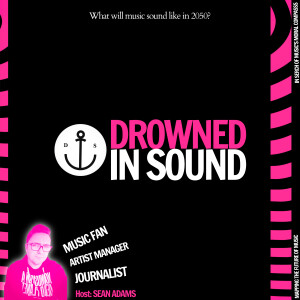
Thursday Jan 02, 2025
Thursday Jan 02, 2025
This year marks 25 years since Drowned in Sound launched, and rather than obsessing about the past, we will be gazing into the future, trying to work out what music will be like in 2050.In this prologue episode, Sean Adams, the founder of Drowned in Sound, reflects a little bit on his 25-year journey and examines the current challenges facing music, from economic barriers to the impact of technology and AI. He discusses the importance of grassroots venues, the role of music in our lives, and the potential for both dystopian and utopian futures. Along the way, he plans on speaking with industry experts, musicians, and pioneers to uncover insights and envision solutions for a sustainable and vibrant music ecosystem. Join this open research project to explore how we can shape a better future for music.This was an unscripted ramble, so you can read a little more in our recent newsletter.00:00 Introduction: The Big Question for 202500:35 Reflecting on 25 Years of Drowned in Sound02:07 Challenges Facing the Music Industry04:22 Exploring Solutions and Innovations06:53 The Future of Music: Utopia or Dystopia?08:36 Join the Journey: Open Research Project
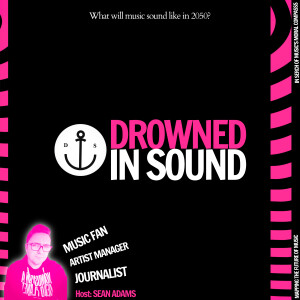
Saturday Dec 14, 2024
Saturday Dec 14, 2024
In part two of this Q&A experiment, Drowned in Sound founder Sean Adams delves into various topics, including the process of discovering new music, the complexities of the music industry, and nostalgic reflections on MySpace and defunct London music venues.
He also touches on the importance of human connection in music curation, potential improvements for music streaming platforms, and the socio-political challenges affecting the UK's music industry post-Brexit. Additionally, Sean reflects on memorable interviews.
Thank you to everyone for your questions, please submit any for the next edition to sean@drownedinsound.org and be sure to subscribe to the newsletter at drownedinsound.org
![Why weren’t [insert band] massive? Music’s true value? Gaffes? - Q&A Special: Part 1](https://pbcdn1.podbean.com/imglogo/ep-logo/pbblog21041250/cc26b5a7a0023f2fe5c69cf99ce96c36_300x300.jpg)
Thursday Dec 12, 2024
Thursday Dec 12, 2024
To mark Drowned in Sound's 24th anniversary and before we begin a new season of the podcast, Drowned in Sound founder Sean Adams answers your questions.
Here are some links related to topics covered in the Q&A in case you'd like more context.
Listen to: Choose a Bright Morning by Jeniferever on Bandcamp
Read: Wendy Roby's brilliant review of Plastic Beach by Gorillaz
Listen to: Mystery Jets featuring Laura Marling
Read: Mike Diver's 2005 interview with Saul Williams
Read: DiScover Santigold
Questions for this episode submitted by our social media followers and over on the Drowned in Sound forums:
Sweetsonix on Twitter: A nice easy one. How do we return respect to, and appreciation of, the arts?
Anthony Gibbons who wrote for DiS in the early days: I've had my fair share of interviewing gaffes in my time, so what is the most cringeworthy question you've asked an interviewee and what was their response?
Body in the Thames: If you had to do it all over again, what one thing would you change?
My Yada on DiS forums: What was the first review on the site?
Drastic Measures: Were you aware that Drowned rhymed with Sound when you came up with the name, or was it just a happy coincidence?
Icarus Smicarus: If you could be a DiS album review, which DiS album review would you be?
Jamie Cameron: What happened to Jeniferever?
Rose Wiles: Favourite gig at Verdis?!
Karl Hamilton: Why weren't Microdisney massive?
Sign up to our newsletter at http://drownedinsound.org
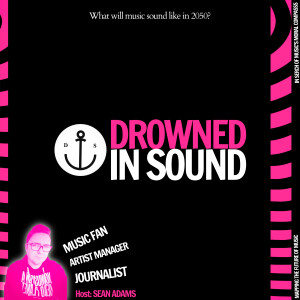
Tuesday Feb 27, 2024
Tuesday Feb 27, 2024
Elijah is a profound thinker and this conversations draws on his influential grime nights with Stormzy & Skepta, writing about music, DJing and to his Yellow Square instagram posts, which are a form of community-building journalism that act as prods and prompts that agitate thoughts into focus.
DiS021 | S2: The Future of the Music Press EP13
From his experience as a pirate radio DJ to running Butterz label & clubnights to being a musician and artist manager, Elijah considers yellow squares to be a former of journalism and the conversation explores the ecosystem that feeds into it and swirls around it.
In this conversation with Drowned in Sound founder Sean Adams, we discuss mediums and spaces, online platforms and club cultures. The conversation sways from curation as a form of journalism, the YouTube mindset, Twitter, 10 minute or 10 hour radio shows.
We also try to deconstruct the gatekeeper and the creative challenges facing people working in music, journalism and anything that involves publishing online. We also discuss the joy of Tumblr, yow electronic music in the UK clusters around its pirate radio, BBC media structures, and why not all clubs closing is a bad thing.
Quotes out of context:
“What’s the musical equivalent of a community note?”
“Some people say ‘I don’t make any money’. Well, what do you sell?”
“Imagine if a review is all the possibilities that the album lays down”
“It's one bit of work. With all these different mediums, but it’s just the language hasn't adjusted to, to serve that yet, you know what I'm saying?”
“…there's a hundred thousand, ten thousand histories happening at once. And that's like something that music journalism, the box, cannot fully capture.”
“People just think, ‘oh, that's their job to write about music.’ And it's like, no, their job is to sell advertising space wrapped around the coverage of music. That's what magazines have been historically. Right?”
Links
Eli1ah on Instagram
Various links: https://linktr.ee/Eli1ah
YouTube recommendation: Super Eyepatch Wolf
YouTube recommendation: Nathan Zed
Make The Ting album
Eli1ah's Resident Advisor Takeover
Further reading: "Close The App, Make The Ting": Elijah's Yellow Squares are making a difference by cutting through the noise (DMY)
Podcast referenced with Bandcamp founder
Please note, this conversation took place in November 2023.
If you're enjoying this podcast, please sign up and support our new newsletter at DrownedinSound.org.
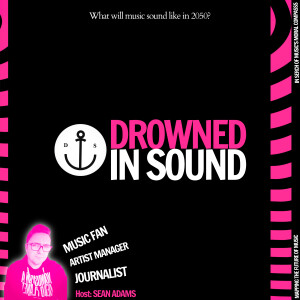
Sunday Feb 04, 2024
Sunday Feb 04, 2024
How do you become a magazine editor that can put Kate Bush on the cover? And what’s it like running a genre-specific title in 2023?
In a world where the digital age is rapidly redefining media, Sean Adams (@seaninsound) meets a titan of the magazine world, Jerry Ewing, editor of PROG magazine for a rare interview. From his roots starting a Marillion-inspired fanzine to being at the helm of genre-defining publications such as Classic Rock and Metal Hammer, Jerry's journey is a testament to the enduring power of specialist knowledge and passion-driven journalism.
Episode Highlights:
The Genesis of a Genre Journalist: Jerry recounts the serendipitous moments that led him from crafting a fanzine to steering the course of iconic music magazines.
The Art of Magazine-making: Delve into the craft of curating content for a niche audience, the evolution of magazines in the internet era, and the potential resurgence akin to vinyl's comeback.
Defining the Undefined: What is progressive rock? Jerry challenges the conventional confines, advocating for a broad, idea-driven definition that encompasses the innovative spirit of the genre.
Adapting to the Beat of Change: The discussion turns to the seismic shifts in media consumption and the strategies for staying relevant in a landscape transformed by technology.
The Human Touch: Jerry envisions a future where the human element is not just a feature but a proud declaration in magazine-making.
Notable Quotes from Jerry Ewing:
"Progressive music's reach is quite wide... It's the ideas and the approach to making music that sets them apart."
"Understanding your readers is crucial... Be comfortable with your readership, and they'll feel comfortable with you."
"The editor guides the magazine... decides what goes in it, helps point the tone."
"For our readers, it's the music that matters... They're not interested in sex, drugs, and rock and roll."
"Communication between human beings is at the root of journalism."
Further Insights:
From Court Jester to PROG: Jerry's DIY beginnings and the transition from fanzine to professional journalism.
The Inclusive Vision of Prog: Embracing a wide spectrum from prog metal to experimental indie, Jerry's editorial direction is as diverse as the genre itself.
The Editor's Role: Setting the tone and creating a dialogue with music aficionados, Jerry's editorial philosophy is about crafting a space for in-depth musical exploration.
The Vinyl Moment for Magazines: Speculating on the tangible allure of print in the digital age, and the unique value it could regain.
Links:
PROG Magazine
Jerry Ewing on Twitter
Subscribe to Drowned in Sound on Substack
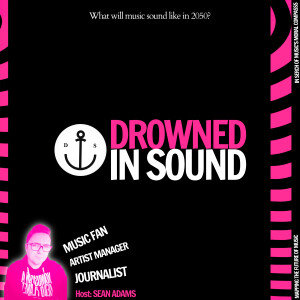
Sunday Feb 04, 2024
Sunday Feb 04, 2024
Award-winning reporter Julia MacFarlane explains what the music press can learn from traditional news journalism.
As Drowned in Sound's podcast season looking at the future of music media continues, we wander into the world of international journalism with award-winning reporter Julia MacFarlane. With a wealth of experience reporting on major global events for the BBC to ABC News, Julia shares her unique insights into the art of covering huge stories and the challenges of conveying truth in an age of misinformation.
DiS018 | Season 2: The Future of Music Journalism EP10
Highlights:
From Beirut to Brexit: Julia discusses her experiences covering critical global events.
The 'One Decision' Podcast: Learn about Julia's co-hosting experience with former Chief of MI6 Sir Richard Dearlove, where she interviews experts on a range of pressing topics.
Challenges of Modern Journalism: Julia reflects on the importance of accuracy and impartiality in journalism, especially in high-stakes international reporting.
Self-Shot Journalism: Julia discusses the challenges and rewards of self-shooting journalism and the necessity of recording events impartially and accurately.
The Power of Personal Stories: Understand the role of personal narratives in making complex global issues relatable and understandable.
Key Quotes:
"Recording events as they happen is vital... it's important to have professionals who are trained to record things accurately and impartially." - Julia MacFarlane
"The BBC was a crucial connection to home and world events for English-speaking families abroad." - Julia MacFarlane
"In filmmaking, whether you're a solo journalist or part of a team, finding compelling stories and voices is essential." - Julia MacFarlane
Timestamps:
[02:06] Julia's Background and Career Path
[14:03] Challenges and Responsibilities in Journalism
[29:17] Insights from 'One Decision' Podcast
[34:23] Navigating Journalism in the Digital Age
More:
For more on Julia MacFarlane's work, check out the "One Decision" podcast and follow her on social media (Linkedin | Instagram | X | Threads).
Enjoyed this episode? Share it with a friend or leave us a review on Apple or Spotify.
For updates about Drowned in Sound, subscribe to our Substack newsletter
Hosted and Produced by Sean Adams.
